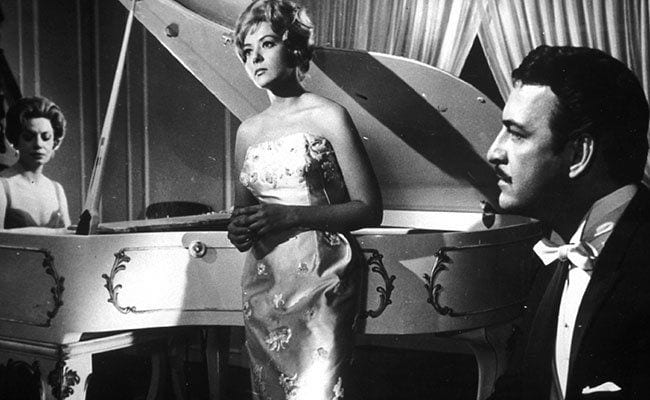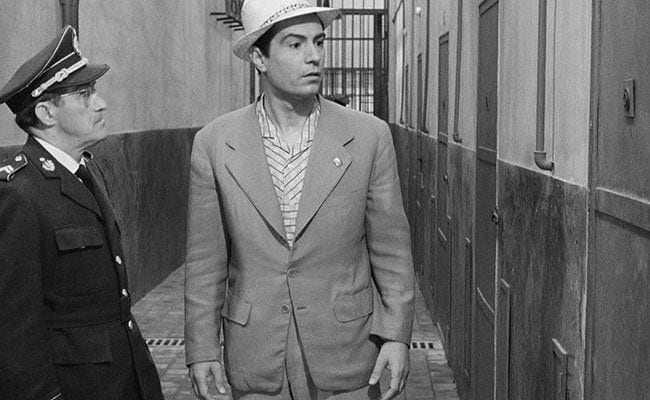
10 Alternative Horror Films
Sick of the same old scarefests? Here's a list of 10 alternative fright films that may satisfy your Halloween cravings.

Sick of the same old scarefests? Here's a list of 10 alternative fright films that may satisfy your Halloween cravings.

Each werewolf film recommended here illustrates how effective -- and ethereal -- the late night/lycanthrope subject can be.

Not all scary movies are horrifying. Sometimes, they're downright deranged. Watch these and you'll never look at your furniture, your appliances, your parents, or anything the same way again.


Cinema is the perfect setting for the surreal. Without the necessary visual element to add emphasis to the ideas, the weird and wonky way a filmmaker finds to get to his point would be lost. Sure, you can set the strange on stage, but the artifice of performance will remove a bit of the bizarre. No, what you require is the self-contained world of film, and perhaps, a man as gifted and insightful as Spanish auteur Luis Buñuel.
In a career which saw the creation of such modern movie classics as Un Chien Andalou (1929), Diary of a Chambermaid (1946), Belle De Jour (1965), and The Discreet Charm of the Bourgeoisie (1972), one of his most important works remains one of his most elusive. The Exterminating Angel (El Ángel Exterminador, 1962) is clearly meant as a critique of the post-Spanish Civil War rise in elitism. What it ends up being is a brilliant blank slate, a statement without the clarity that allows you to impose whatever viewpoint or philosophy you feel the craziness delivers.
The basic premise sees a group of rich folk meeting at the manor of Señor Edmundo Nóbile (Enrique Rambal) and his wife, Lucia (Lucy Gallardo). Without warning, the servants disappear. Suddenly, the group appears trapped in the fancy home. Throughout the course of their confinement, they become less and less “courteous” and begin indulging in decadent and taboo-breaking behavior. There are even animal and other “blood” sacrifices involved, with the entire narrative exploring the depths of human depravity while trying to undermine the perceived superiority of the rich.
For fans of the genre, The Exterminating Angel plays like a less repugnant Salo (1975), or a more rarified The Cook, The Thief, His Wife, and Her Lover(1989). It argues for its symbols and yet never settles on a single interpretation. It’s the kind of open-ended experiment that different people see differently. One moment, the current political climate is being roasted; the next, personal idiosyncrasies and eccentricities are explored.
As part of the Criterion Collection’s wealth of added content, we get a full-length documentary which traces the filmmaker’s roots and reveals the possible reasons for his late in life turn toward the more unusual and oblique.
Still, it’s easy to see the basics. Buñuel clearly blames the wealthy and influential for life under Spain’s frightening dictator (Franco) and takes the opportunity here to knock them down several significant pegs. At first, he wants you to see how lazy and thoughtless they are. Then he moves into the cutthroat and cruel. By the end, he’s lowered them even further, redefining privilege as desperation and arguing that money does not make a person better than others (or better than their former selves), it just causes isolation.
The church suffers a few blows as well, and the overall tone is absurdist. We get the obvious mocking (a group of sheep flock toward their religion) and miss many of the more individualistic jabs. But perhaps the quality that The Exterminating Angel shares with other surrealists is the undeniable ability to make sense out of what others would see as senseless. David Lynch also has this ability. In films like Eraserhead (1977), Lost Highway (1997), and Inland Empire (1993), he can take material that should appear pointless and random and provide an elusive inner logic that has it all flowing effortlessly.
Lynch is also a good point of reference for those unfamiliar with Buñuel and his approach. When Guillermo Del Toro took on Franco’s fascists in the brilliantly fractured fairy tale, Pan’s Labyrinth (2006), he made his points in big Brothers Grimm-like pronouncements. But someone like Lynch looks beyond the surface of things. He goes deeper, and more diabolically, into places others would not. So does Buñuel — and The Exterminating Angel was just the beginning. He would explore the genre further with later efforts like The Discreet Charm of the Bourgeoisie (1972), Phantom of Liberty (1974), and his final film, That Obscure Object of Desire (1977).
The new Criterion Blu-ray looks and sounds sensational, but that’s par for the course. It’s what we’ve come to expect from these experts in preservation, even if the extras are merely passable (only the documentary is definitive). For many, a movie like this will be an extended example of self-indulgence and purposeful obfuscation. For others, especially those who know what to expect from Buñuel and his canon, it will be a much-needed addition to the collection.

Ben Affleck’s Live by Night is good at era-appropriate garb, but its adaptation of Dennis Lehane’s story lacks sizzle and scope.





